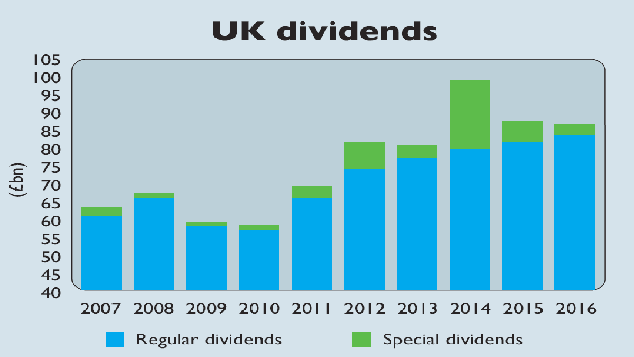
Stockmarket investors make most of their money in the long run by reinvesting dividends. A hundred pounds invested in UK stocks in 1899 would have turned into an inflation-adjusted £28,261 by the end of 2014, assuming all income had been reinvested. Without reinvestment, the £100 would only have grown to £184, says Barclays’ latest annual Equity Gilt Study. So it’s worth keeping an eye on the outlook for dividends. Unfortunately, that’s not especially encouraging right now.
Investors depend “on the fortunes of just a few industries” for their income, says Buttonwood in The Economist. In Britain, France, Germany and Switzerland, more than 70% of all dividends come from just 20 companies. Banks were reliable income sources until the crash. Then miners and oil and gas firms became key. But now the commodities boom has turned to bust, threatening payouts.
This is a particular problem for the commodities-heavy UK stockmarket and is the main reason that dividends across the FTSE 350 are expected to fall this year. Last year, dividends (excluding special payouts) rose by 6.8% to a record £84.6bn, says Capita Asset Services (see chart). This year the figure looks set to fall for the first time since 2010, dropping nearly 1% to £83.8bn. Since October, around £3.4bn of cuts have been announced. Anglo American has cancelled its £900m payout. BHP Billion, which paid out almost £2bn in 2016, looks vulnerable.
Meanwhile, Standard Chartered has axed a £1bn dividend, and the market will lose SABMiller’s £1.3bn payout now that it is being taken over. Supermarkets continue to struggle amid a vicious price war. Food and drug retailers paid out 57% less in 2015 than the year before. Meanwhile, the broader economic backdrop seems to have deteriorated. Accountancy firm EY reports that profit warnings from UK-listed companies rose to 313 last year, up from 299 in 2014 and the highest since 449 were issued in 2008.
Because 40% of British dividends are declared in dollars, the pound-dollar exchange rate has a major impact on income. Here at least, there is good news. Last year, the strong dollar added £2.5bn to the annual total, estimates Capita, and currency gains accounted for two-thirds of the growth in FTSE 100 dividends. If the pound maintains its current rate against the dollar, investors can expect a further £1bn income boost in 2016.